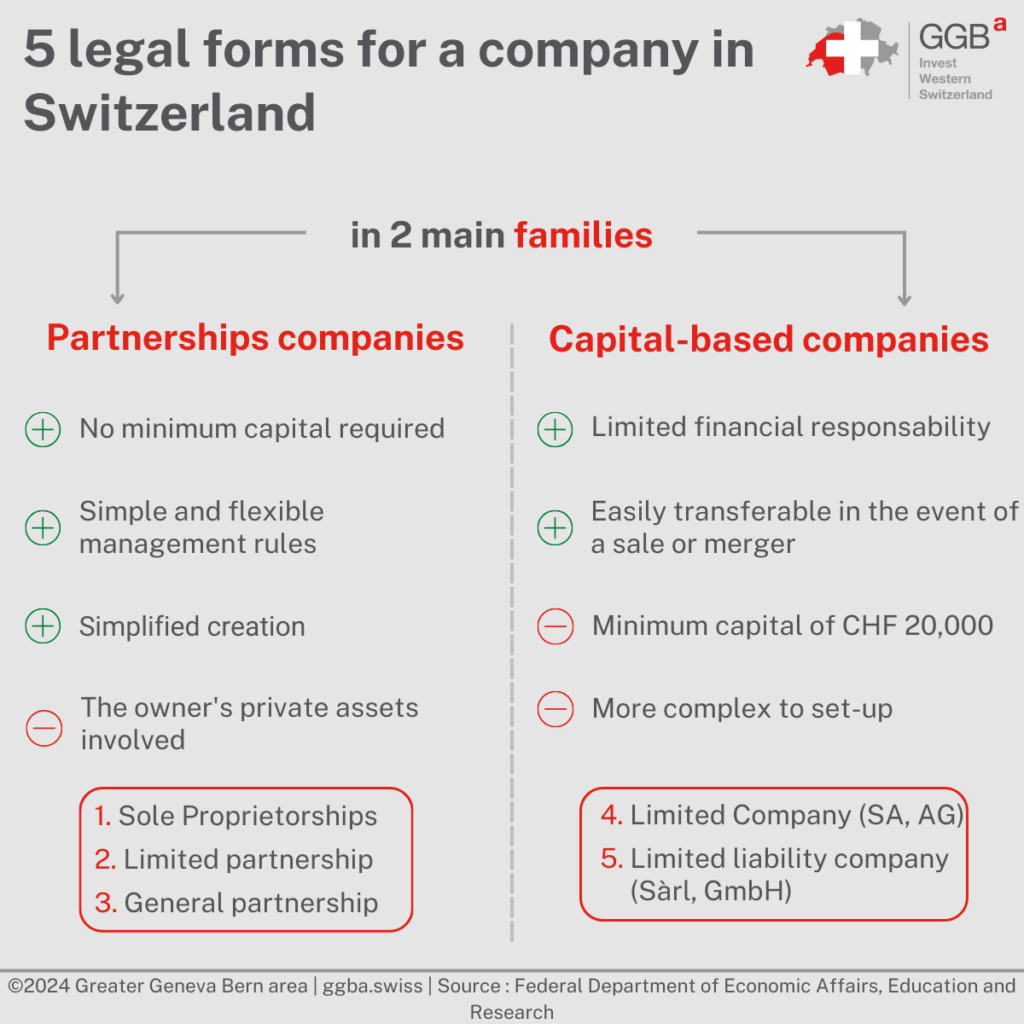
Choosing a legal form for your business in Switzerland

When setting up a company, it is important to choose the right legal form. In Switzerland, there are eight different configurations, each one meeting specific needs.
Partnerships and corporations: two main types of companies
There are two main types of companies: partnerships (sole proprietorships, limited partnerships, and general partnerships) and capital-based incorporated companies (stock corporations and limited liability companies (LLC)). These two types are distinguished by the level of risk involved. If a person wants to bear the responsibility for the debts with their private assets, they should choose a partnership. In this case, the partners are personally responsible for the debts of the company. In return for this high level of individual liability, the formalities for setting up a partnership and the rules for managing it are less strict and complex than those for a corporation. For the latter, only their assets constitute the pledge of creditors, which limits the personal liability of the partners because only their contribution to the business is involved. In other words, the partners are not unlimitedly responsible for the debts of the company and therefore do not run the risk of losing their assets in case of financial difficulties for the company.
Criteria to consider when choosing a suitable legal form
In Switzerland, there are several options for creating a company:
- Forming an unincorporated or incorporated company;
- Setting up a branch office;
- Acquiring an existing company in Switzerland (either unincorporated or incorporated);
- Forming of a joint venture (unincorporated or incorporated company);
- Forming a strategic alliance with or without an equity interest.
The choice between these configurations depends on the company’s goals. In order to make an informed decision, it is important to consider various factors such as:
- Capital: the amount of investment and equity needed must be analyzed. Does the company need a lot of capital to start and grow, or can it operate with limited funds? To determine these different amounts, it is agreed to take into account the capital needs for the current year as well as for the next three to five years;
- Risk and liability: It is important to consider the level of liability and risk that partners are willing to take on. For example, are they willing to be liable for the company’s debts on an unlimited basis, or do they prefer to limit their liability? Note that greater responsibility often comes with greater freedom of action.
- Independence: the legal form of the company can limit the options for action. Anyone starting a business must decide whether they want to work alone or with partners, and whether they prefer purely financial investors or active partners.
- Taxation: depending on the legal form, the income and assets of the business and the owner are subject to different taxation rules. In general, large profits are taxed at a lower rate in corporations than in partnerships or sole proprietorships.
In order to define your needs adequately, it may be useful to consult professionals such as the Greater Geneva Bern area (GGBa). Such specialists can help you define your needs and determine which legal form is the most suitable for your company.

1. Limited company
A limited company is a form of limited liability company in which the share capital is divided into shares. In the event of bankruptcy, the partners only lose their share capital, which is an advantage in terms of liability and capital regulation. This form of company is suitable for large and small to medium-sized enterprises (SMEs) and is often used for holding and finance companies.
A limited company can be founded by one or more natural or legal persons. However, there must be at least one shareholder, who can be a natural person, legal entity, or another commercial company.
The process of creation is long, and the foundation costs are higher than for partnerships. In fact, at the time of foundation, at least CHF 50,000 must be placed in a blocked bank account in Switzerland, called a capital deposit account. The mandatory capital of the company (share capital) amounts to at least CHF 100,000.
Three bodies are necessary for a public limited company:
- The general meeting gathers the shareholders and ensures fundamental tasks such as the adoption of the articles of association, the appointment of the Board of Directors, and the appointment of auditors.
- The Board of Directors is the management body of the general meeting. It is composed of one or more members who are not necessarily shareholders. There are no requirements regarding the nationality or place of residence of the members of the Board of Directors. However, at least one person authorized to represent the company must be domiciled in Switzerland (without having to be a Swiss citizen). According to the law, it is the members of the board of directors who are liable in case of damage caused by a breach of duty (voluntary or involuntary).
- The auditors are responsible for internal control in public limited companies. Small and medium-sized enterprises (SMEs) can choose not to have an auditor or to limit the auditing of their accounts.
To create a stock company, the following steps must be taken: registration in the commercial register, notarization of the foundation, approval of the articles of association, selection of the Board of Directors, and certification of the auditor.
2. Limited liability company (LLC)
Limited liability company (LLC) is a form of business entity that combines the characteristics of a corporation and a general partnership. It is particularly suitable for small and medium-sized enterprises (SMEs) and family businesses. The LLC is a company with legal personality, uniting two or more persons or companies into a single enterprise with a predetermined share capital. Each partner participates in the share capital by holding one or more shares. The minimum contribution is CHF 100 and the minimum share capital is CHF 20,000, which is a relatively low capital. This lower share capital is an advantage compared to the limited company but it implies giving up anonymity because each partner, including those who join the company later, must be registered in the commercial register. The shares can be transferred by simple written agreement. In principle, all partners have the right to manage the company collectively, but at least one director must be domiciled in Switzerland.
Three bodies are necessary in a LLC:
- The general assembly: the assembly of partners is the supreme body of the LLC. It is responsible for the adoption of the articles of association and the appointment of the director/manager and the auditors.
- Management: the LLC does not need a board of directors, which keeps structural costs relatively low. However, this means that all responsibility lies with the manager.
- The auditors are governed by the law of corporations.
To establish a limited liability company, the following steps must be taken: registration in the commercial register, notarization of the foundation, approval of the articles of association, selection of the manager, and certification of the auditor’s verification.
3. Branch Office
In Switzerland, a foreign company can establish a branch office instead of a subsidiary. A branch office is a form of company that offers a certain organizational and financial independence from the foreign parent company. From a legal point of view, the branch is part of the foreign company, but it can enter into contracts and transactions in its own name. It may also be involved as a plaintiff or defendant in local court cases. Any branch office must be registered in the commercial register. For licensing, registration, taxation, and accounting purposes, the branch office is considered a Swiss company. To establish a branch in Switzerland, a foreign company must have an authorized representative domiciled in Switzerland.
4. Limited Partnership for Collective Investments (LPCI)
The limited partnership for collective investments (SCPC) is similar to the Limited Liability Partnership (LLP) in Anglo-Saxon countries. This form of company is only intended for qualified investors as a venture capital investment vehicle. Contrary to the provisions of the Swiss Code of Obligations concerning limited partnerships, which require that the partner with unlimited liability be a natural person, the limited partner of the SCPC must be a corporation.
This legal form has existed in Switzerland since 2006 and offers investors and limited partners an alternative to the LLP in Luxembourg, Ireland, or the islands of Jersey and Guernsey. This new legal form strengthens the Swiss financial center and defines the conditions for offering professional services in the fields of venture capital, private equity, and hedge funds in Switzerland.
5. Sole proprietorship
A sole proprietorship is a form of company commonly used by small entrepreneurs. It is recommended when a natural person carries out a business activity alone, i.e., when they run a business or a company. The owners of a sole proprietorship bear the risk of the business and are responsible for it with all their personal and business assets. In return, they can decide for themselves on the business policy to be adopted. If the business is successful, it can easily be “transformed” into a corporation. If it fails, its liquidation is simpler than in the case of other legal forms. Furthermore, a sole proprietorship only needs to be registered in the commercial register if its annual turnover exceeds CHF 100,000.
A sole proprietorship is founded once it has taken up an independent and sustainable economic activity.
6. General partnership
A general partnership is particularly suitable for small businesses where the partners have close personal and business ties. It is formed when two or more individuals join to operate a business commercially. A general partnership is created through a contract between the participants. Moreover, like sole proprietorships, it has no legal personality of its own: it is not the partnership that is taxed, but each partner individually. As a result, the partners are liable for their assets in an unlimited and joint manner.
To establish a general partnership, it is necessary to register in the commercial register and to conclude a partnership agreement, although the latter is optional (but highly recommended). This agreement defines the shares in the company as well as the shares in the company’s profits. In the absence of a partnership agreement, the partners are subject to the legal rules for general partnerships, which may limit their ability to manage their business in the desired manner. Therefore, it is strongly recommended that a partnership agreement be entered into to establish the rules and responsibilities of each partner.
7. Joint venture
The joint venture is a form of partnership that is becoming increasingly common. It is not regulated by law and is often used when activities are carried out jointly with a Swiss partner. The joint venture is often designed as a joint participation in the capital of a newly created capital company (for example, a foreign supplier creates a manufacturing or sales company with a Swiss seller). In the case of small projects (for example, a limited-duration research project), the joint venture can also be operated as a simple company.
8. Ordinary company
A simple company is a contract concluded between several physical or legal persons to achieve a common goal using common resources or means. The creation of a simple company does not require any particular form. Registration in the commercial register is not possible. As it is only a community of interests, the simple company does not have its own legal personality and cannot have its own corporate name (name). The partners are jointly and fully responsible for all the company’s commitments.
In a nutshell: There are eight different legal configurations for companies in Switzerland, which allows everyone to find the model that best fits their business. To choose the right legal form, it is therefore advisable to consult professionals, such as GGBa.
Greater Geneva Bern area (GGBa) is the investment development agency for Western Switzerland. If you would like to learn more about the legal forms of companies in Switzerland or other subjects that may help you in your implementation, please contact us.
Our “Why Switzerland” articles may answer the questions you have.

